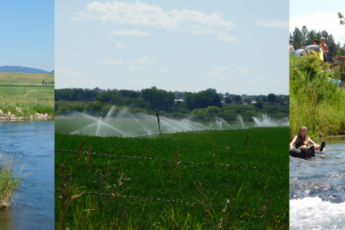State Agencies, Private Businesses and Local Government work to increase hemp processing in Montana
No longer is hemp a taboo topic, something whispered about behind closed doors over cups of coffee or shots of whiskey. Last summer, during the second season of Montana’s industrial hemp pilot program, farmers grew roughly 22,000 acres of hemp. Montana emerged the top hemp-producing state in the nation, likely beating out Colorado which had 30,825 acres of hemp registered but likely only planted 18,000 to 21,000. This upcoming summer — now that the 2018 Farm Bill decriminalized this benign plant — there will likely be an uptick in hemp production.
Montana’s farmers are an innovative and opportunistic bunch. If given the chance to grow a promising new crop, they’ll do it and they’ll do it well. As commodity prices continue to fluctuate or drop and as summers become hotter and drier, many farmers turn to hemp as an alternative option with loads of potential.
While we know Montanans can grow hemp, the jury is still out on whether or not they can sell it on any large scale. Many folks are still sitting on their harvests from 2017 and 2018 because the industry is missing a key component: processing.
There are many ways to process hemp, depending on the intended end product. Folks can extract or isolate the medicinal compounds from the flower or leaves, press the seeds for food-grade oil, or separate the fiber and the hurd into useable byproducts. That means each harvest has a lot of potential; that also means that each process requires its own expensive equipment.
Image from North Carolina Department of Agriculture
If Montana is to continue to be the leader in this field, farmers need a place to sell the fruits of their labor. Luckily, hemp processing is the talk at the watering hole right now. State agencies, business owners and our local government recognize the timely need for processing opportunities. If we, as a state, don’t figure something out soon, the rest of the country may gain the lead and the promise that this cash crop will save Montana’s family farms may fall flat.
“We can grow it. Given the season and how dry it was, it grew well,” said Katon Gerky in an interview with Prairie Populist. Gerky and his father grew 11 acres on their farm outside of Havre and hope to plant more next year. They both appreciate the versatility of hemp; they enjoyed watching it grow, and they noted how many bees the field attracted. But like many farmers, they’re still sitting on the harvest.
“There’s such a huge potential market for it, especially if we can get the production locally,” Gerky said. “You’re going to have a really hard time getting more people on board if you can’t process it.”
The Montana Department of Agriculture supports hemp as a new commodity
During the pilot program’s early days, the Montana Department of Agriculture helped farmers navigate the intricacies of legally growing a federally controlled substance. Folks at the department pumped a lot of resources into supporting farmers and ensuring the crop’s success. Today, they continue to work with the USDA to make sure that Montana’s hemp program is compliant with federal regulations.
The department is in the early stages of forming a Montana Hemp Advisory Committee. Starting in 2019, 25 producers petitioned the department to start the process of creating a commodities committee for hemp. In February, the department held listening sessions in Sidney and Helena to hear input from growers, producers and purchasers regarding the proposed committee. The crowd in Sidney voted unanimously in favor of moving forward; in Helena, the vote was nearly unanimous. Next, the Department of Agriculture will send a paper ballot to all known producers and growers to vote on some of the specifics of the potential committee.
If approved, the committee would advise the department on laws, testing, sampling protocols, seed varieties and research. Committee members would also gather resources to market products, determine new uses for commodities, host conferences and promote trade.
“You as individual growers can pool your resources and achieve a spending power that otherwise wouldn’t be possible,” said Zach Coccoli, an attorney at the Department of Agriculture, at the listening session in Helena on February 7 to a room full of producers and processors.
The last time the department formed a commodity advisory committee was for pulse crops, the industry-term for beans, peas and lentils. In 2015, Montana was the number one producer of pulse crops in the country. Today, with the help of the Montana Pulse Crop Committee, producers continue to find innovative ways to process, market and sell these crops locally and abroad. A similar group may help Montana’s hemp industry gain the same level of success.
Private businesses expand the state’s processing plants
While an advisory committee will expand the state’s potential to research, market and sell this commodity, many in the private sector have already begun to fill Montana’s void in hemp processing.
A handful of smaller facilities across the state already process hemp for medicinal purposes or press the seeds for food-grade oil. A hemp farmer in Helena even has a small decortication machine, which separates the fiber from the hurd to create byproducts used to make everything from paper and plastics to hempcrete, a concrete alternative. New processing facilities are in the works in many locations throughout Montana including Babb, Conrad and Cascade County.
This is a great start, but we will need a lot more processing facilities in order to handle the volume that our farmers can produce.
Chris Christiaens, Project Specialist for the Montana Farmers’ Union, is a former state senator who first introduced hemp legislation back in 2001 and still continues to advocate on behalf of farmers and the hemp industry. In a recent hearing with the Senate’s Taxation Committee, Christiaens noted there are a lot of potential processors ready to invest in Montana. He spoke of three companies looking to open facilities in Great Falls. He mentioned a buyer in California is interested in buying all the hemp fiber that the state can produce and process.
Image from the State of New York
“It’s time now, since we have been raising very successfully industrial hemp for the last two years,” said Christiaens, “that we bring processors into Montana to be able to give our producers an opportunity to sell their crop at the highest rates.”
“It’s an exciting time for farmers and ranchers,” he continued. “They’re ready to sell.”
Senator Tom Jacobson proposes legislation to encourage the hemp industry
Like Christiaens, Senator Tom Jacobson of Great Falls supports the hemp industry. Jacobson, along with over 125 current and potential growers, attended a Montana Farmers’ Union meeting in Great Falls in December, 2018. After the meeting, Jacobson said he had “a huge awakening” concerning hemp’s potential for both producers and processors. As a result, Jacobson decided to sponsor three bills during the current Montana legislative session that would directly impact the industry.
“There’s a lot of potential for economic opportunities for Montana farmers and Montana communities,” Jacobson said in an interview with Prairie Populist. “We need to keep the ball going.”
One of Jacobson’s bills deregulates the industry, cuts unnecessary, clunky rules — such as background checks for growers — put in place when the feds considered hemp to be more dangerous than cocaine. His other bill gives the Department of Agriculture the power to set up a statewide hemp program. Such a bill will help producers better market, brand, transport and legitimize their products.
“We feel a statewide run program is a further step in remaining competitive,” said Liv Stavick of the Montana Farm Bureau during the bill’s hearing with the Senate Ag Committee.
Makenna Sellers of the Northern Plains Resource Council also supports Jacobson’s bill on the statewide hemp program. “We think that hemp will give farmers one more potentially profitable area to explore and diversify their operations, adding resilience to farms in our state and adding to their bottom line,” she said. “When Montana’s ag producers do better, our rural communities and our state as a whole does better.”
The Department of Agriculture, Montana Farmers Union, and a handful of producers and processors also testified at the committee hearing in support of Jacobson’s bills.
Jacobson’s third bill, and perhaps the most consequential for processors, would exempt hemp processing equipment from taxation.
“This bill basically adds hemp processing facility to a bill that we passed last session that provided property tax exemption to agricultural processing facilities such as canola, malted barley and industrial dairy.” Jacobson said during the hearing of the Senate Taxation Committee. If hemp had been deregulated at the time, Jacobson added, the 2017 Legislature probably would’ve included it in the original bill.
Hemp processing equipment is incredibly expensive, primarily because it’s such a new industry. Producers also need a variety of regional processing options because each hemp product and hemp variety can require different processing equipment. For Jacobson, as well as the producers and processors who support his bill, his proposed tax exemption would motivate investors to buy into Montana’s hemp industry.
However, Jacobson admits his proposal is “a meager incentive compared to what other states are doing.” Some states offer grants and financial incentives to attract processing plants to their area. For example, Kentucky, which only grew 18,000 acres of hemp last year, has a dozen processors in place. But this is a feasible step that the state can easily do without touching its bottom line; Montana won’t lose any existing tax revenue with this bill because the industry is so new that the state hasn’t benefited from it yet.
“[Montana] will continue to grow and this is one of those moments where we’re either going to be on the front end of this or we’re going to be lagging behind,” said Jacobson. “And hopefully, this bill will help us get on the front end because as we produce more and more hemp across the state, what we’re going to need is a market for that hemp.”
He added that Montana will need a way to process the hemp, too.
Jacobson envisions a future where there are a variety of hemp processing plants across the state. There are larger ones that process fibers, seeds and hurd in the drylands of Eastern Montana, and small boutique facilities that process the medicinal elements in the wetter parts of the state.
“You’re going to see a little bit of everything,” Jacobson told Prairie Populist. It will bring “more jobs and more economic opportunity.”
-Amanda Garant
AS FARMERS’ INTEREST IN HEMP GROWS, REPUBLICAN LEADER PROPOSES BIG CHANGES
FARM BILL EASES REGULATIONS ON HEMP PRODUCTION
Got something to say to Prairie Populist? Send news tips, story ideas and comments to [email protected]. If you have something to submit, or an idea for a story you’d like to write for us, check out our Submission Guidelines here.


